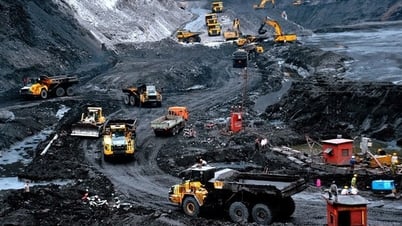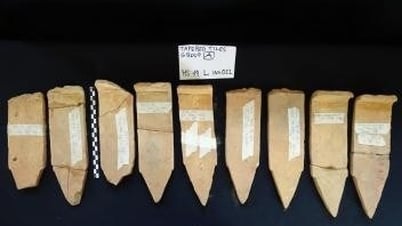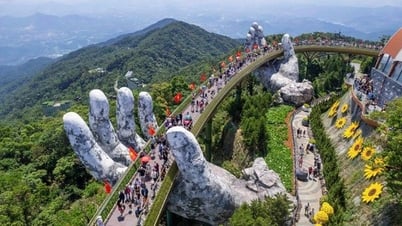The iceberg is no longer there, but scientists have discovered remarkable traces among other mineral deposits near Mars' equatorial region. The sediments there often contain brightly colored sulfate salts.

Salt deposits, shown in light blue, are likely sites of glaciers near the Martian equator. Photo: NASA
As the scientists looked closer, they recognized features of the glacier, including ridges called moraines—debris deposited or pushed by a moving glacier. The team also discovered fissures, or deep crevices that form inside the glaciers.
The findings were shared Wednesday at the 54th Lunar and Planetary Science Conference in The Woodlands, Texas.
“What we found was not ice, but a salt deposit with detailed morphological features of a glacier,” said Dr Pascal Lee, senior planetary scientist at the SETI Institute and the Mars Institute.
Researchers believe the glacier is 3.7 miles (6 km) long and 2.5 miles (about 4 km) wide, with a height of 0.8 to 1.1 miles (1.3 to 1.7 km).
“This region of Mars has a history of volcanic activity. And when some of the volcanic material comes into contact with river ice, chemical reactions occur at the boundary between the two to form a hardened layer of sulfate salt,” study co-author Sourabh Shubham, a PhD student in geology at the University of Maryland, said in a statement.
“This is the most likely explanation for the hydrated and hydroxylated sulfates we observed in this light-colored sediment,” he added.
Study co-author John Schutt, a geologist at the Mars Institute and a guide to ice in the Arctic and Antarctic, said the volcanic material likely eroded over time, revealing the salt layer that bears the traces of the glacier and its distinctive features.
Mars has a thin atmosphere, allowing space rocks to regularly collide with the planet’s surface. But the glacier’s beautiful, detailed features remain largely undisturbed in salt deposits, leading researchers to believe it is relatively “young.”
The study authors say they think the glaciers began 2.9 billion years ago and are still ongoing.
Mai Anh (according to CNN)
Source























































![[Maritime News] Two Evergreen ships in a row: More than 50 containers fell into the sea](https://vphoto.vietnam.vn/thumb/402x226/vietnam/resource/IMAGE/2025/8/4/7c4aab5ced9d4b0e893092ffc2be8327)












































Comment (0)